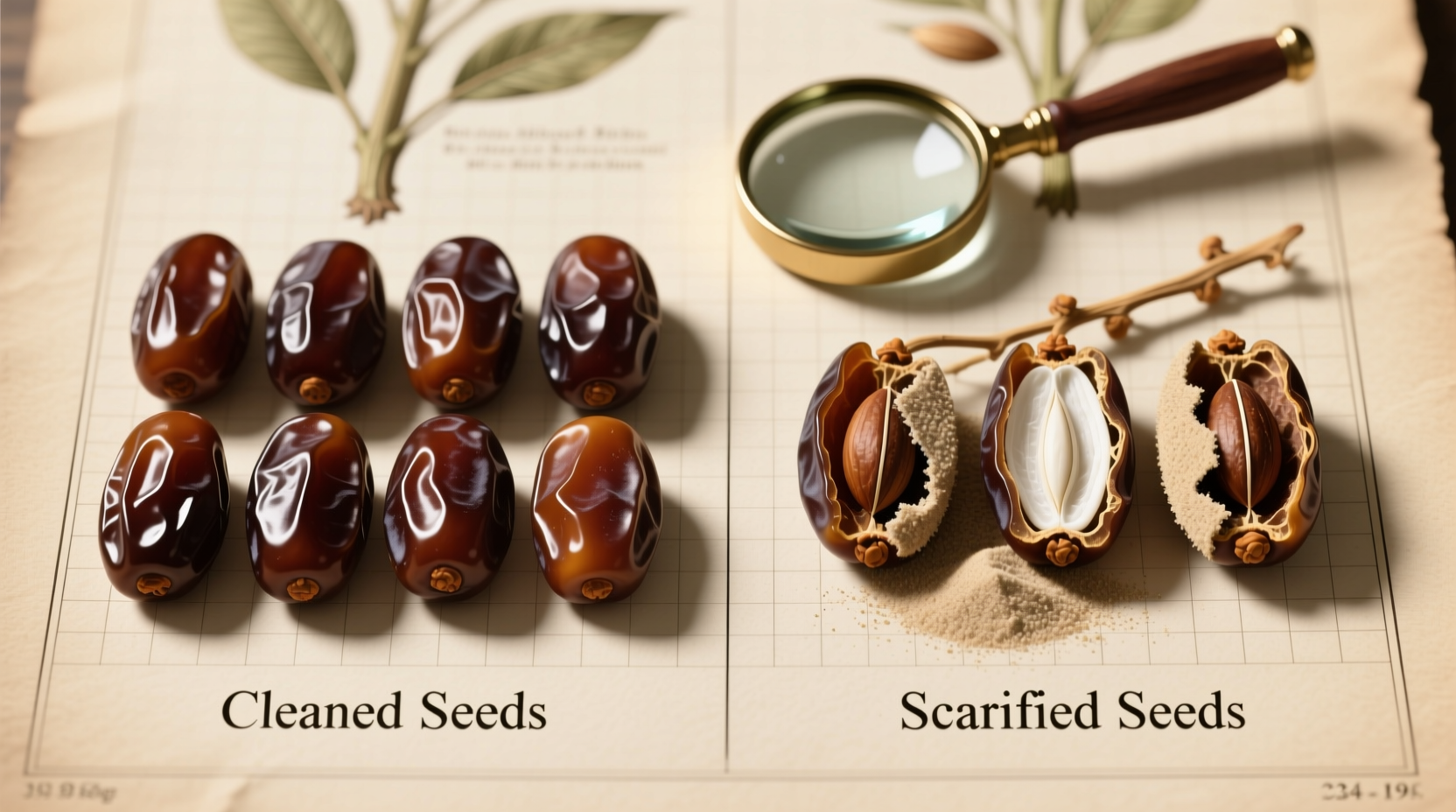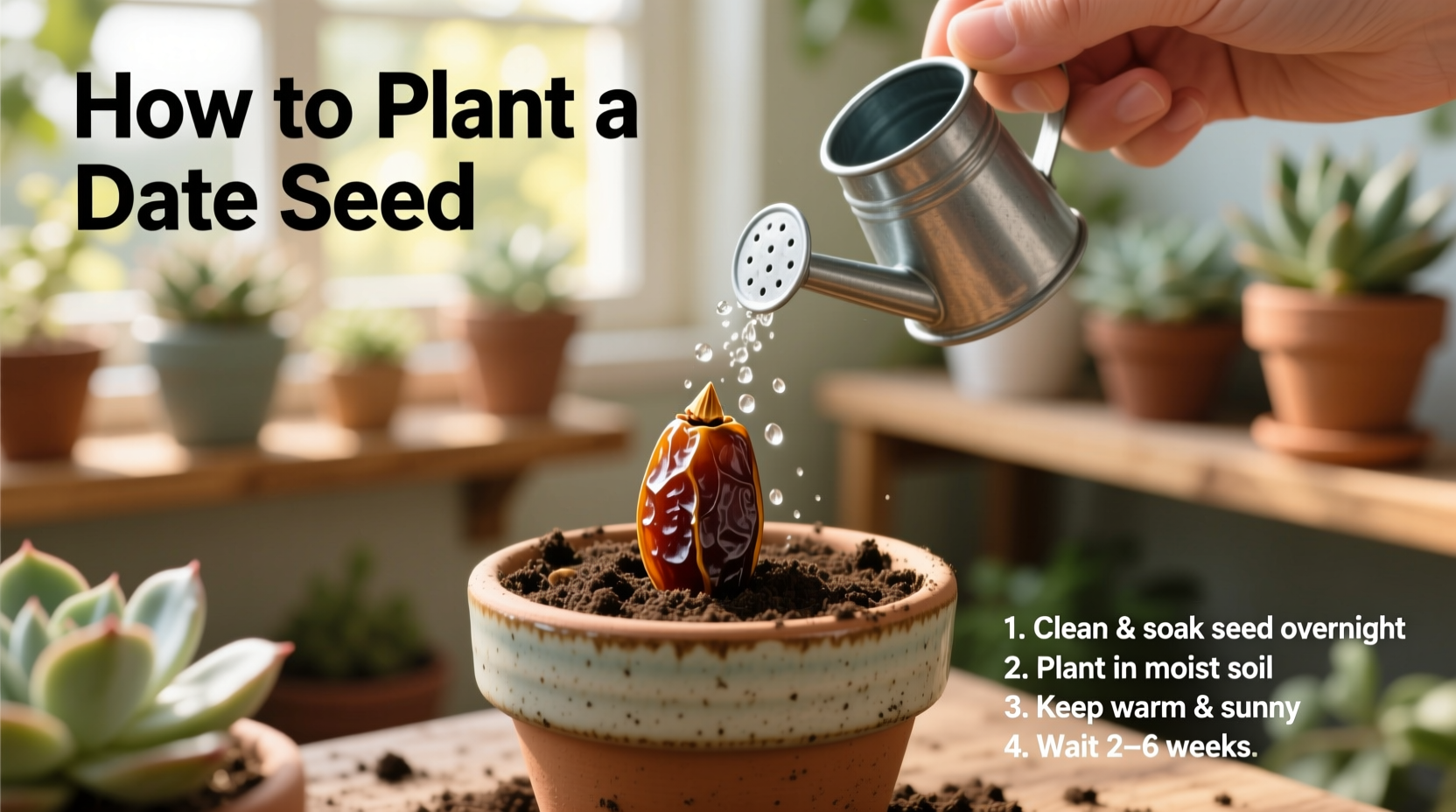Yes, you can successfully grow a date palm tree from seed with proper preparation and care. While store-bought date seeds have a 30-40% germination rate, fresh seeds can reach 70-80% success. Expect 3-8 weeks for sprouting and 5-8 years before your tree produces fruit. This guide provides proven techniques used by horticulturists to maximize your chances of growing a healthy date palm.
Understanding Date Seeds: Setting Realistic Expectations
Before planting, understand that not all date seeds will germinate successfully. Commercially available dates are often from female trees but may have been treated or stored in ways that reduce viability. According to University of California's Agricultural and Natural Resources department, fresh date seeds germinate at significantly higher rates than dried commercial varieties.
| Seed Type | Germination Rate | Time to Sprout | Fruiting Timeline |
|---|---|---|---|
| Fresh date seeds | 70-80% | 3-5 weeks | 5-7 years |
| Store-bought date seeds | 30-40% | 5-8 weeks | 6-8 years |
| Commercial nursery seeds | 85-95% | 3-4 weeks | 4-6 years |
This fact对照 table shows why seed selection matters. Commercial growers typically use nursery-grown specimens rather than seed propagation because date palms are dioecious (separate male and female plants), and seed-grown trees may not produce quality fruit. The University of Florida IFAS Extension confirms that only about 50% of seed-grown date palms will be female and capable of producing fruit.
Preparing Your Date Seed: The Critical First Steps
Proper seed preparation dramatically increases your success rate. Start by selecting plump, undamaged seeds from fresh dates if possible. While you can use seeds from grocery store dates, their germination rate is lower due to processing methods.
Cleaning process:
- Remove all fruit residue by soaking seeds in warm water for 24 hours
- Gently scrub with a soft brush to eliminate remaining pulp
- Rinse thoroughly under running water
- Disinfect by soaking in a 10% bleach solution for 5 minutes
- Rinse again with clean water
Scarification (nicking the seed coat) significantly improves germination. Using sterilized nail clippers, carefully make a small cut in the seed's hard outer shell without damaging the embryo inside. Research from the California Rare Fruit Growers Association shows scarified seeds germinate 2-3 weeks faster than untreated seeds.

Germination Process: Creating the Perfect Environment
Temperature control is critical for successful date seed germination. Date palms require consistently warm conditions—ideally between 80-100°F (27-38°C). Below 70°F (21°C), germination becomes significantly slower or may not occur at all.
Recommended soil mix:
- 50% cactus/succulent potting mix
- 30% perlite or pumice
- 20% coarse sand
Plant your prepared seed 1-1.5 inches deep in a 4-6 inch pot with drainage holes. Water thoroughly until moist but not soggy. Create a mini greenhouse by covering the pot with plastic wrap or placing it in a clear plastic bag. Place in a warm location away from direct sunlight.
Check moisture levels every 3-4 days, misting with water if the soil surface appears dry. Most date seeds will sprout within 3-8 weeks, though some may take longer. Be patient—date palms are slow starters!
Caring for Your Date Seedling: Beyond Germination
Once your date seedling emerges, gradually acclimate it to normal conditions. Start by removing the plastic covering for a few hours each day, increasing exposure over 7-10 days. Move to a bright location with indirect sunlight—direct sun can scorch young seedlings.
Watering schedule for seedlings:
- First 2 months: Keep soil consistently moist (not wet)
- Months 3-6: Allow top inch of soil to dry between waterings
- After 6 months: Water deeply when top 2 inches feel dry
Fertilize monthly with a balanced, water-soluble fertilizer at half strength once the seedling has 2-3 true leaves. The Royal Horticultural Society recommends using a fertilizer with higher potassium content to support palm development.
Long-Term Growth: From Seedling to Mature Tree
Transplant your date palm when roots begin emerging from drainage holes, typically after 6-12 months. Choose a container 2-3 inches larger in diameter. Date palms prefer slightly root-bound conditions, so avoid oversized pots.
When growing date palms outdoors, select a location with full sun and protection from strong winds. These trees thrive in USDA zones 9-11 but can be grown in containers elsewhere and brought indoors during cold months. Remember that date palms require both male and female trees for fruit production—a significant limitation of seed-grown specimens.
As your tree matures, adjust your care routine:
- Water deeply but less frequently
- Fertilize quarterly with palm-specific fertilizer
- Remove only completely brown fronds
- Protect from temperatures below 20°F (-7°C)
Troubleshooting Common Issues
Mold on seeds: If you notice mold during germination, remove the plastic covering immediately. Wipe affected seeds with a cotton swab dipped in diluted hydrogen peroxide (1 part peroxide to 3 parts water). Ensure proper air circulation moving forward.
Slow growth: Date palms are naturally slow growers, especially in their first year. If growth seems exceptionally slow, check your light conditions and consider adding a grow light. Also verify you're not overwatering, which can cause root issues.
Yellowing leaves: This often indicates overwatering or nutrient deficiency. Allow soil to dry more between waterings and apply a balanced fertilizer. If only the oldest leaves yellow, this is normal as the plant directs nutrients to new growth.
Can I grow a date palm from seeds bought at the grocery store?
Yes, but with lower success rates. Grocery store date seeds typically have 30-40% germination rates compared to 70-80% for fresh seeds. The drying process used in commercial date production reduces viability, and these seeds often take longer to sprout.
How long does it take for a date seed to sprout?
Date seeds typically sprout in 3-8 weeks under optimal conditions. Scarified seeds may sprout in 3-5 weeks, while untreated seeds can take 5-8 weeks. Some seeds may take up to 12 weeks, so patience is essential when learning how to plant a date seed successfully.
Will my date palm grown from seed produce fruit?
Possibly, but not guaranteed. Date palms are dioecious (separate male and female plants), and seed-grown trees have about a 50% chance of being female. Even female trees take 5-8 years to potentially produce fruit, and the quality may not match the parent date due to genetic variation.
What's the ideal temperature for germinating date seeds?
Date seeds require consistently warm temperatures between 80-100°F (27-38°C) for optimal germination. Below 70°F (21°C), germination becomes significantly slower or may not occur. Using a seedling heat mat can dramatically improve success rates when attempting to plant date seeds.











 浙公网安备
33010002000092号
浙公网安备
33010002000092号 浙B2-20120091-4
浙B2-20120091-4